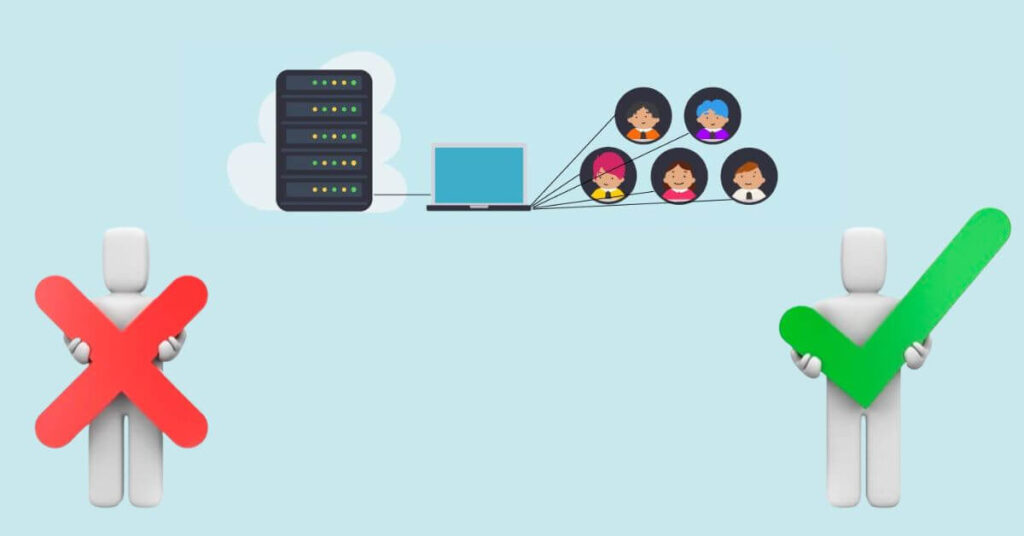Pros and Cons of Shared Hosting – fully understand the concept of shared Web hosting and its advantages and disadvantages, you need to take a step back to the generic concept of hosting.The latter is none other than a service made available by web servers thanks to which users of all kinds have the possibility of using a server to support websites or online pages and make them accessible to all online users.
There are different hosting solutions on the market , each of which offers customers a certain service more or less suitable for certain uses.
Typically the breakdown is based on three broad categories namely free hosting, VPS hosting and shared hosting .
Having done this necessary preamble to frame the discussion well, with the help of the friends , the experts in the sector, let’s analyze in detail the scope of shared hosting, its advantages and disadvantages .
The scope of shared hosting
Shared hosting , a topic of interest to us, represents a paid service that companies offer to users on the web, who can take advantage of a particular server with certain specifications capable of physically containing the data of individual sites.
By definition, shared hosting is a type of hosting that shares the same server for several sites, therefore the same resources, the same physical space, the same RAM, the same processor and so on.
Each user can usually choose between various packages to select the one of his interest, that is, suitable for what are the specific needs.
As a rule, companies that deal with shared hosting have three types of packages available for customers: basic shared hosting for small sites, one for medium-sized sites and one for large portals.
In this way, every private or professional user can identify the product that best fits their expectations.
Shared hosting must be linked to a second-level custom domain and therefore for a fee that we can buy wherever we want, but which is often included free of charge in the service.
Now let’s see what are the advantages and disadvantages of a shared server.
Pros and Cons of Shared hosting
Advantages of Shared hosting:
Already from how we have framed the speech very briefly, it can be deduced that it is a very advantageous service, which more users rely on to pursue their goals.
It follows that a user who decides to use shared hosting will benefit from:
- Payment once a year for the chosen service with the most common methods such as bank transfer or Paypal;
- Ability to choose from multiple shared hosting services;
- Much cheaper service than VPS;
- Various packages available to choose from;
- Simple, practical and guided installation;
- Possibility of installing and managing the service without the intervention of professionals and technicians;
- Security available thanks to professional managers who take care of it for us;
- Automatic backup of your website on a periodic and pre-established basis;
- Absence of a physical machine present in the office or on site, whose maintenance costs are to be borne by the end user/customer;
- Repairs performed by the provider and at no cost to users;
- Possibility to manage the service you have opted for in a personalized way.
Disadvantages of Shared Hosting:
But what are the cons of these services?
Surely like everything, there is the downside to evaluate, because of course you have the advantage of paying for a very little service, but you certainly won’t be able to “host” very large-scale sites.
Therefore, when you purchase shared hosting that allows other websites in addition to ours to be able to exploit it, you must know that:
- The use of the server you rely on has a scope limited to the purchase package. Which more simply means that if you need more space or more power you will be forced to upgrade the package to a higher one;
- All the resources available on the server are divided (and shared) among the various users;
- If one of the users tends to channel a large traffic compared to what the web server could actually support, all the sites supported on this particular server will be slowed down and will suffer the consequences;
- You cannot create customized performances of your web hosting as the only one who can manage the entire physical machine is the provider.
How do you choose shared hosting
It therefore arises spontaneously to ask how one should do to make use of a shared hosting that is of quality .
Overall, the advantages are more than the disadvantages, but in general there are precise assessments to be made, also considering what kind of needs our website has and what we expect from a shared hosting service.
Only after a detailed analysis will it be possible to decide whether or not to buy such a product.
For example, if you own a small e-commerce, with a not very large product catalog, shared hosting could also be a good idea, since your site will not have particular needs.
On the other hand, a large e-shop needs a tailor-made service for it, that is, created to meet every minimum need. In this case, shared hosting may not be for you.
Whatever you need to buy for your website, you can only do it by having data and statistics in your hands. This is because if there is a sudden spike in traffic or a considerable number of visits, the idea of having shared hosting may not be as wise as it was in the beginning.
Always remember that the online site is your window on the world of the web, and if it doesn’t provide a certainty or a small guarantee to visitors, it will lose share right away.
Evaluate well whether or not it is appropriate to opt for shared hosting.

